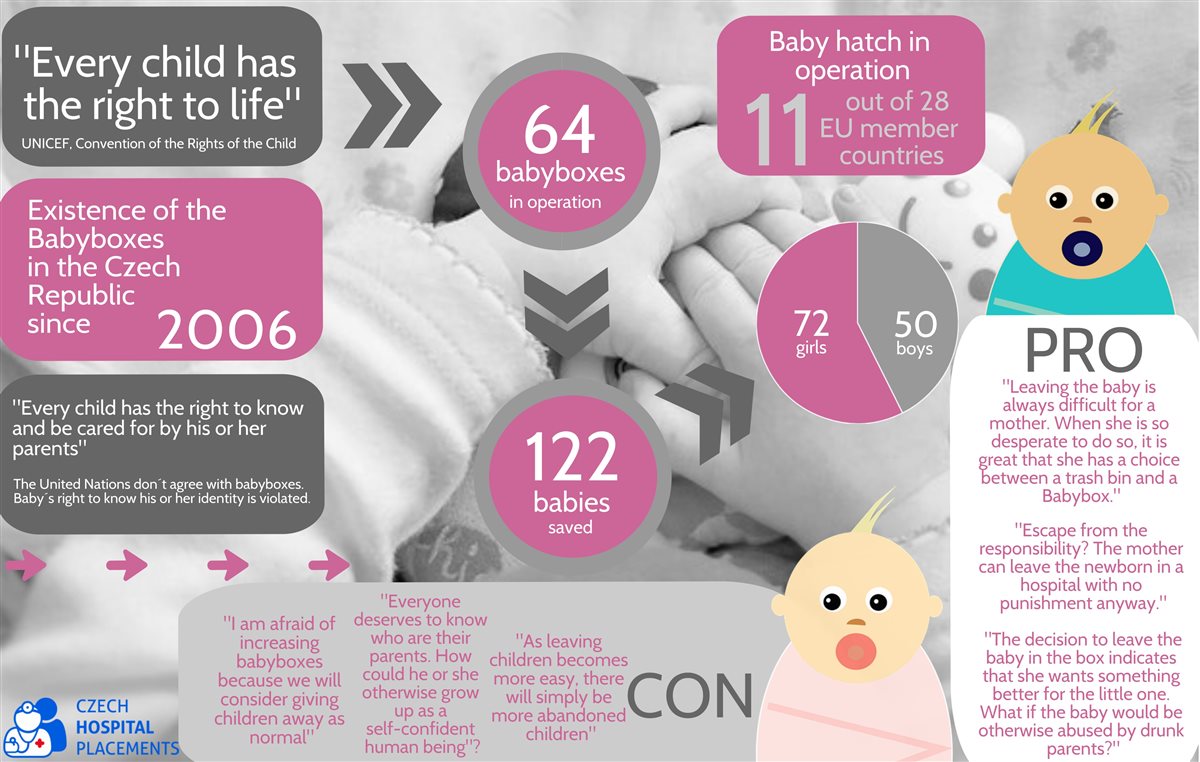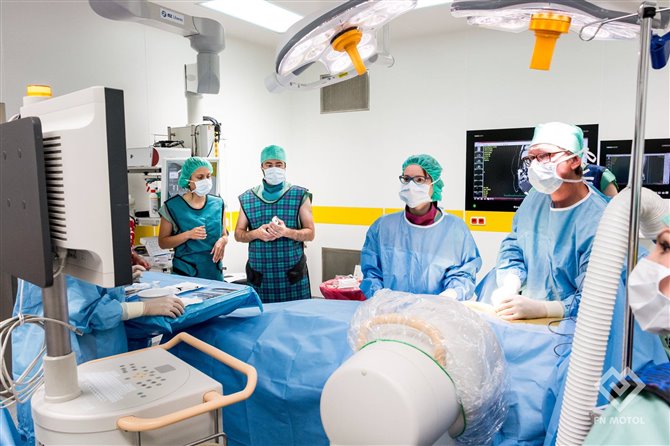The Babybox: a Priceless Idea to Save a Baby or a Violation of Human Rights?
Written by Czech Hospital Placements on Tuesday, May 3, 2016
Babybox Baby Hatch Mothers Child Neonatology Hospital

The nightmare of a city street: a newborn is found by a passer-by, abandoned down a dark, cold alley. The Babybox is a special hatch that offers a safe alternative for hopeless mothers, who are unable to cope with parenthood for various reasons and feel too ashamed to be identified. Until today, 122 babies have been found in Babyboxes, situated in big Czech cities since 2006. The Czech Republic is one of 11 European Union countries (out of 28), where this anonymous way to leave a child in a safe environment without being legally persecuted is possible. The big question is: do the baby hatches provide the best help for desperate women and save newborn lives, or does it just increase the irresponsibility of parents?
There are many opponents, as well as the United Nations, claiming that baby hatches violate the child´s right to know their identity.
On the other hand, supporters argue that the first right of everyone is the right of life. For then, the Babybox fulfills its role perfectly.
Some women find themselves in a very difficult life situation, after giving birth to their boy or girl. Their reasons for giving up parenthood are often young age, alcohol, or drug addiction. The mothers have no courage to bring the child into the hospital directly, as they want to stay anonymous. In that case the Babybox should protect the newborn from being left in the street.
The baby is placed inside of the warm box
From the outside wall of the hospital, there is a small steel door. After pulling the handle, the mother (usually) opens the warm box, with a neatly folded blanket on the bottom. She then places her baby inside, anonymously. Finding there the “dear mother letter”, the woman is encouraged to change her decision of leaving of her child and asked to contact the hospital when she gets better.
Usually born just a few hours earlier, the little one is then picked up by hospital staff which are alerted by an inner monitoring system. Then the baby is passed to the neonatal department to get a profound medical examination and the best possible care. When the mother does not return for them in the relevant time period defined by the law, the baby boy or girl is legally free to be adopted by new parents.
Is it a crime to get rid of a newborn anonymously?
The legal aspects are at issue. While a child is left that way, it stands against their right to know their identity. Also, there is a chance that anyone else can bring a baby (the father for instance) without the mother´s consent. Leaving the child in the Babybox is not against the law. That makes the opponents angry because of the lack of responsibility. In their opinion, women now have an easy way of how to get rid of a child with no punishment – and we shouldn’t consider that to be normal.
 On the other hand, the supporters say, there are many children having only a mother´s name in their birth certificate. Isn´t that a violation of the right to know the identity, too? Their strong argument is, that the mother who decides to leave her baby would do it anyway, but in a more dangerous place instead. In that comparison, the hatch is a salvation.
On the other hand, the supporters say, there are many children having only a mother´s name in their birth certificate. Isn´t that a violation of the right to know the identity, too? Their strong argument is, that the mother who decides to leave her baby would do it anyway, but in a more dangerous place instead. In that comparison, the hatch is a salvation.
The problem is, that the child doesn´t know his or her own heritage. The doctors don´t know if the parents suffered from diseases, whether the mother had proper prenatal screenings, or if there were any complications during birth. So presuming the child´s physical and mental development is more difficult then. Also, the adoptive parents would like to know the baby´s family medical history to determine possible hereditary disorders.
Baby hatches in China are crowded
In the Chinese town of Kuang – Chou, the baby hatch had to be closed after only 3 months of being in operation. The center was not able to cope with the 292 children left there in such a short time period. All of the newborns suffered from diseases, such as cerebral palsy or the Down´s syndrome. According to experts, the main reason for leaving newborns was that the parents’ couldn´t afford the treatment. The one-child policy in China also highly affected the situation.
The idea to save babies dates back to the 12th century
The foundling wheels – the round-shaped windows in the medieval churches had served for the same purpose. There was a nun instead of a nurse, and a bell as a forerunner of the electronic alarm system. In those times many babies were born extramarital (the father was not the mother´s husband) and the following punishments were cruel for the mother and baby, too. Giving the child to the church was sometimes the only choice to save them both.
The big topic of baby hatches is still controversial. In the Czech Republic, the company STATIM who operates the Babyboxes is happy for every newborn saved. We will never know, if the little boy or girl would otherwise be left abandoned in public, or if the mother would rather change her mind and bring them up herself. In Hungary, more than 25% of mothers returned for their baby, and more than 30% at least contact the hospital and inform more about their family background to help the child know his or her story.
After all, there is a point where supporters and opponents don´t fight. We should think about how to better support pregnant women in need, to decrease the number of abandoned babies. What could it be? Maybe more centers for women and children, better counselling services, or free contraception financed by the government? What do you think?
















Categories
Behind the Scenes of the University Hospital in Motol
Being a Healthcare Student
Best Adventures While Travelling
Discover the Medical Specialties
Inspiration: Practical Experience of Healthcare Professionals
Obsolete vs. Visionary
The Better Health Care Professional Podcast
Tips and Tricks for Your Successful Career
Top News in Healthcare
Travels in COVID-era